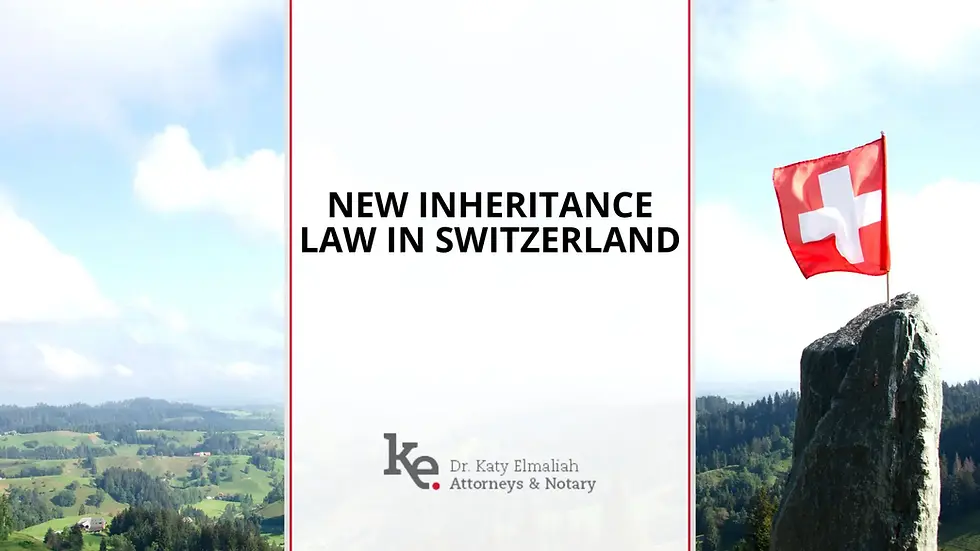New inheritance law in Switzerland – more freedom in structuring the estate
- Elmaliah.com

- Jan 31, 2023
- 4 min read
Updated: Jul 15, 2024

The reform of the Swiss inheritance law passed by Parliament in 2020 has been in force since January 1st, 2023. Above all, this brings one thing: more freedom of choice about the distribution of one’s own estate.
Because the share of the inheritance that can be distributed by will or inheritance contract according to the free will of the testator is now always at least 50%. So far, in some constellations, up to 75% of the estate was tied to the compulsory portion. The compulsory portion is the minimum portion of the estate to which the legal heirs are entitled by law, regardless of the will of the testator, which therefore cannot be freely disposed of by testamentary disposition (testament or contract of inheritance).
Statutory succession and succession determined by a will
Statutory succession occurs when the testator left no will and no contract of inheritance.
Then the heirs are determined by law.
If the deceased leaves behind a spouse or registered civil partner (in the case of same-sex civil partners), they inherit 50% of the estate, if they share the estate with the children or grandchildren of the deceased. If the spouse shares the estate with the parents or siblings of the deceased, they inherit 75% of the estate. If the testator left behind no children or grandchildren, parents, siblings, nephews, or nieces, the spouse or life partner inherits 100%. Attention: There is no statutory succession in favor of cohabiting partners who are not registered life partners in Switzerland. Nothing has changed in these regulations as a result of the reform.
In addition to the spouse or partner, the remainder of the inheritance (i.e. what remains beyond the spouse’s or partner’s share) goes to the children of the deceased in equal shares. If there are no children or grandchildren, the remainder goes to the parents of the deceased or to their siblings or, if they died before the deceased, to the children of the previously deceased sibling.
If the testator left a will or a contract of inheritance, the succession is determined to a large extent by this document and not by the statutory provisions outlined above. However, the testator's freedom of decision is considerably restricted by the right to a compulsory portion, as already described above: Swiss legislators require the testator to give their children (or, if one of the children died before them, their children) and their spouse a significant portion of their inheritance. This legally guaranteed portion is referred to as the compulsory portion. And this is where the last change in Swiss inheritance law can be seen: Until December 31, 2023, the children of the deceased were entitled to 75%, the parents to 50% and the spouse to 50% of their statutory share of the inheritance (as described above).
Withdrawing this compulsory portion is only possible in cases of particular hardship, which are regulated in Art. 478 of the Swiss Civil Code. This includes, for example, serious criminal
offenses against the testator.
For example, if the testator only leaves their descendants as legal heirs, their statutory inheritance is 100% of the estate and their compulsory portion is 75% of the statutory inheritance, i.e. 75% of the entire estate. The testator can only freely dispose of 25% of the entire estate since the rest is bound by the compulsory portion.
The new compulsory portion
Due to the changes that have been in force since January 1st, 2023, the freely available part of the estate has now increased, since the compulsory portion claims have been limited to a maximum of 50% of the statutory inheritance share. As a result, the testator can now always distribute at least 50% of their estate at their own discretion by means of a last will and thus, for example, bring about a more just succession in a cohabiting relationship.
According to the new law, the compulsory portion of the descendants is only 50% of their statutory share of the inheritance and the compulsory portion of the parents has been completely eliminated. In any case, the deceased remains free to dispose of at least 50% of the estate.
Following is an overview of the new mandatory parts:
| Old legal position | New legal position |
progeny | 75% | 50% |
parents | 50% | 0% |
spouse/ registered life partner *in | 50% | 50% |
Old or new law: what applies when?
The old regulations still apply to deaths before the new law came into force, i.e. before January 1st, 2023. The new law applies to all deaths after January 1st, 2023. This also applies if a will was drawn up under the old law. The will does not become invalid due to the change in the legal situation and does not necessarily have to be rewritten. However, it may be that the testator wants to use his new freedom and, for example, wants to bequeath the now higher available portion of their estate to a third party, for example, a friend.
What does the revision mean for my estate planning / my inheritance claim?
Since last wills and inheritance contracts that have already been drawn up remain valid in any case, there is often no urgent need for action. Problems can however arise, if the wording of the respective document shows, that the testator would have made different decisions under the revised law, e.g. because a legal heir should be excluded from the succession as far as possible. The document must then be interpreted for the individual case in the sense of the testator.
When in doubt, it is best to check with your lawyer whether there is a need for action in your particular case. Our law firm will be happy to assist you competently.

Comments